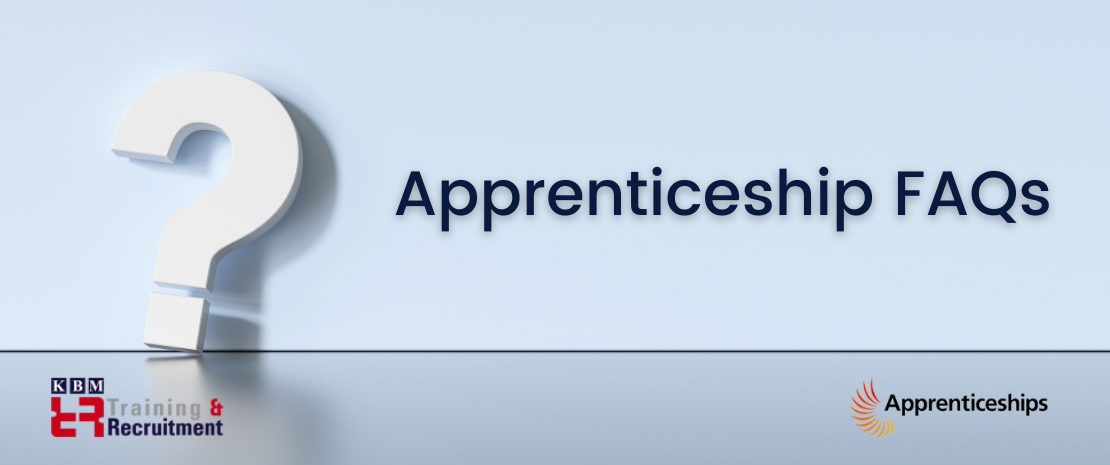
Frequently Asked Questions about Apprenticeships

Apprenticeship combines work and study to acquire specific job knowledge and skills for 16+ people. They are a smooth earning source while learning job-specific skills. It makes an apprentice earns at least the minimum England wage.
We help you free to decide about your apprenticeship suitability. You can contact our Information Advice and Guidance (IAG) experts’ team. They will fully assist you in choosing an appropriate apprenticeship. Our IAG team offer a free comprehensive range of expert advisory services. They help you select a suitable apprenticeship, traineeship, education, training, and employment. Another IAG source is England Government National Career Service (NCS) which you can utilise to check your apprenticeship suitability.
20% off-the-job training is a compulsory apprenticeship component that a Training provider provides. It ensures training plans, induction, and mentoring. The training provider provides valuable on-programme support. They also examine your qualifications progress and work closely with your employer.
In England, level 2 to 6 apprenticeships are available for 16+. The following bullets will elaborate on apprenticeship types and their equivalence:
- Intermediate apprenticeships (level 2) and 5 GCSE grades A*-C or 9-4 carry the same weightage and equality.
- Advanced apprenticeship (level 3), level 3 diplomas, 2 A-level passes, or international baccalaureate carry the same equivalence.
- Higher apprenticeship (level 4) and undergraduate degree's first-year or foundation degree carry the same weightage while equating. Further, there is an equality between a full degree and level 5 higher apprenticeships.
- Degree apprenticeships (levels 6 and 7) are universities' offerings; levels 6 and 7 equal bachelor's and master's degrees, respectively.
We are an experienced higher apprenticeship training provider and helped hundreds of students and professionals. Currently, we deliver a level 4 higher apprenticeship "Professional Accounting Taxation/Technician".
KBM offers advanced apprenticeship standards at level 3, covering roles like Assistant Accountant, Business Administrator, Advanced Credit Controller, and Payroll Administrator.
You can join us for level 2 Credit Controller intermediate apprenticeship programmes.
All 16+ England residents are eligible to gain apprenticeships. However, there are different entry requirements considering apprenticeships, their levels, industry and job role.
Apprenticeships last from one to six years; their duration varies on the level, requirements, sector, and the employer's skills demand. Intermediate Apprenticeships (level 2) have 12 to 18 months lengthy. The Advanced Apprenticeships (level 3) completion duration is 24 months. Higher and Degree Apprenticeship requires 3 to 6 years to achieve.
Employers apply all similar scale employees' conditions to apprentices and pay at least the National Minimum Wage. The employer also pays their apprentices' training or relevant qualifications charges. They have sick leaves, holidays, and other benefits like child care, mentoring, coaching, etc.
Apprenticeships are gradually substituting universities. They are becoming popular because of work opportunities with top UK companies. Alongside, earning while learning is one of the significant apprenticeship benefits, but the following reasons make it more worthwhile:
- Knowledge and skills delivery from industry experts
- A career kick-starting in a great company
- Transferable skills learning
- Progression opportunities
- Mentoring support
- Flexible learning
Apprenticeship rules require working 30 to 40 hours weekly, including 20% off-the-job training. Further, the part-time apprenticeship minimum time is 16 hours a week but with an employer's agreement.
You will apply the same process for an apprenticeship like a job vacancy. Find an Apprenticeship is a valuable information solution on apprenticeship offerings. Alongside managing apprenticeship applications, they send regular apprenticeship vacancy alerts when they arise across England.
The fixed-term agreements end with your apprenticeship completion. Most apprentices with apprenticeship agreements will continue on their permanent employment contract basis with employers. Further, you can progress to the next apprenticeship level or further education.
Yes, you can join an apprenticeship if your employer is agreed.
A broader range of Apprenticeship Standards is across England, focusing on 600+ job roles.
Apprenticeship structured programmes focus on developing a specific sector or industry's knowledge and skills, which is valuable for both employer and apprentice. Apprenticeship design covers essential aspects like qualifications achievement, career progression opportunities, and practical experience for a particular career path.
Over 18 sectors and industries across England organise apprenticeships, including business and administration, legal, finance and accounting, digital, construction, sales, marketing and purchasing, etc.
All apprenticeship programmes are prerequisites for English and Mathematics GCSE grades 4-9. However, if you have not achieved it, you will complete Functional Skills alongside your apprenticeship.
Apprenticeships are about acquiring knowledge, skills and behaviour through workplace practical training while earning a wage. The study programmes develop abilities and knowledge on a full-time college course basis.
EPA is your final apprenticeship stage that impartially examines the knowledge, skills, and behaviours you gained from your training to demonstrate your competence in the apprenticeship standard for a specific job. We assist in EPA because we have End-point Assessment Organisations (EPOs) to help you.



















